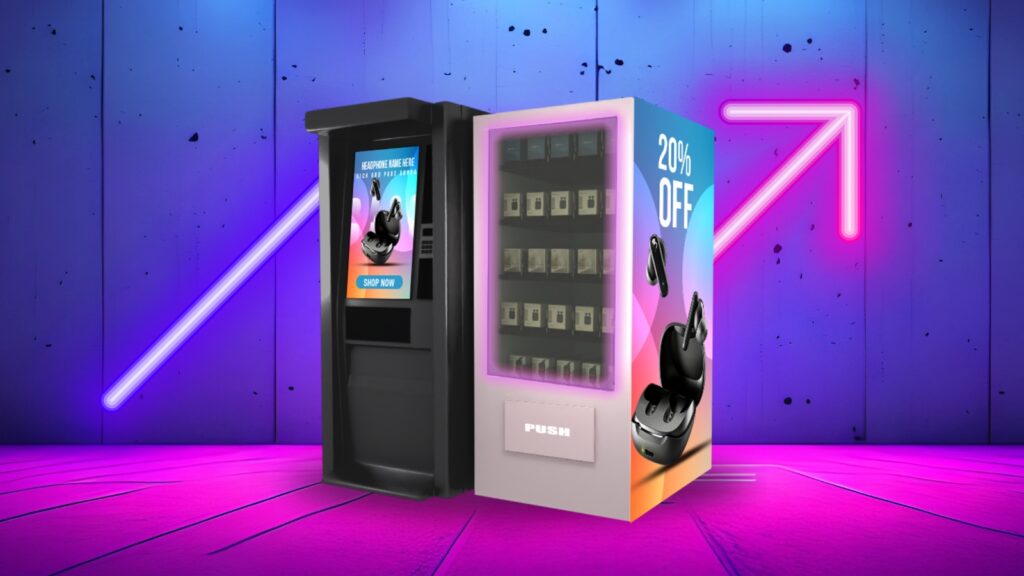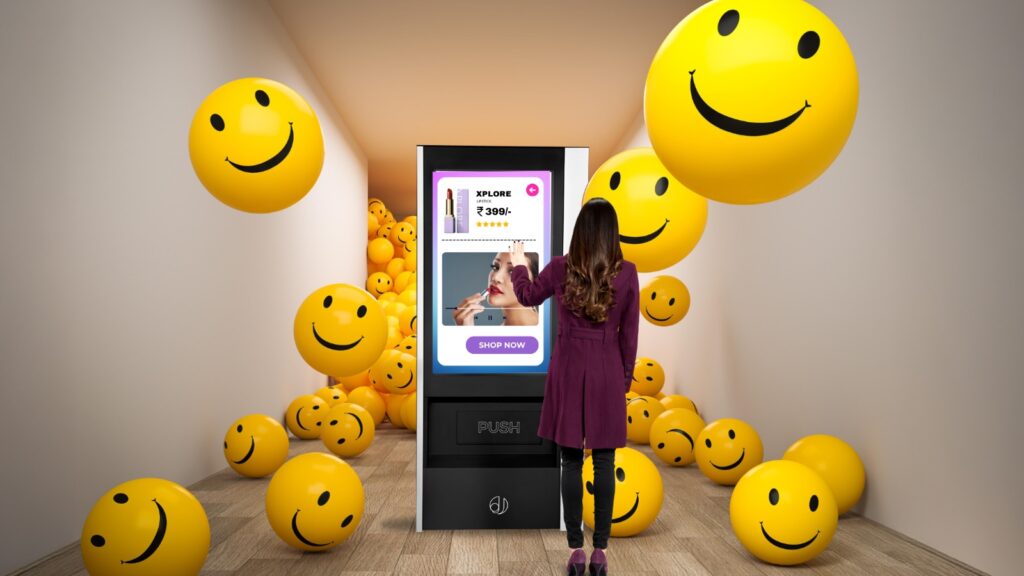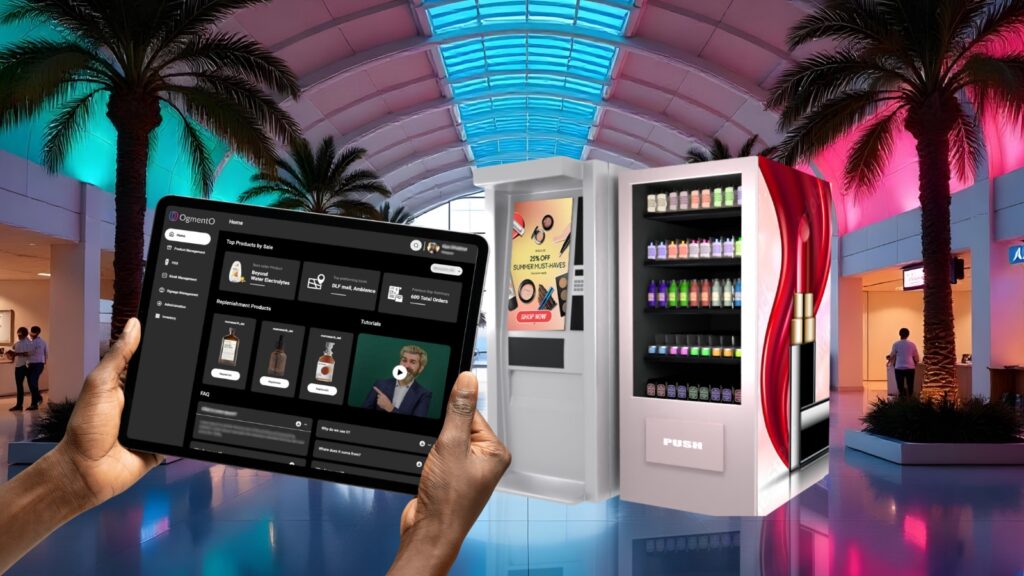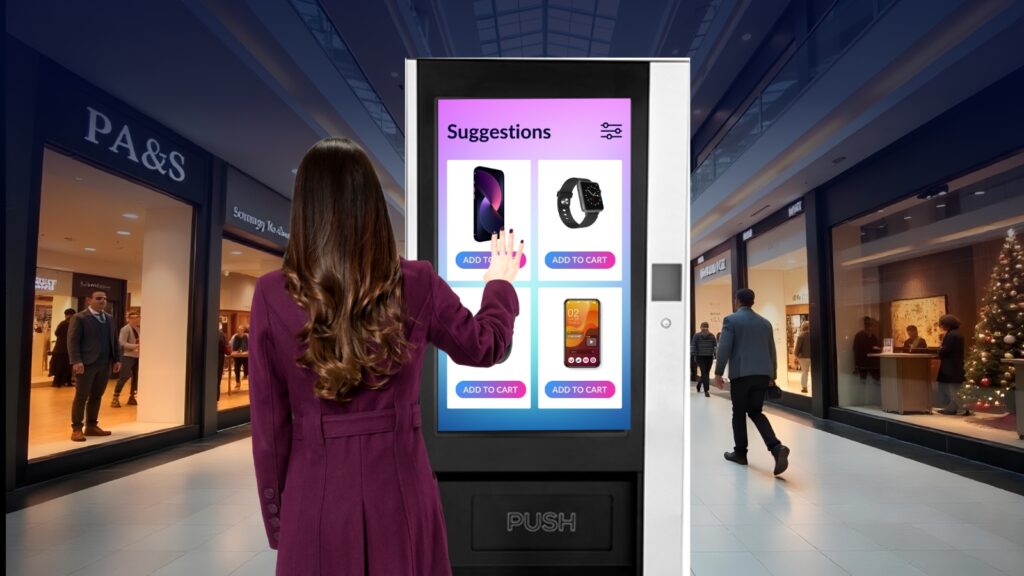In today’s fast-paced world, self-service kiosks and smart vending machines are transforming how consumers interact with businesses across various industries. These technologies enhance customer experiences by reducing wait times, improving efficiency, and offering seamless, personalized interactions.
The global vending machine market, valued at $18.3 billion in 2022, is projected to reach $37.2 billion by 2032, growing at a CAGR of 7.5% (Allied Market Research). This surge is fuelled by increasing demand for on-the-go convenience, cashless transactions, and dynamic customer engagement.
As the need for omnichannel retail experiences grows, smart vending machines have emerged as critical tools to bridge the gap between physical and digital retail. Combining the efficiency of self-service with the engagement of advanced technology, these machines go beyond simple transactions, creating memorable and personalized experiences.
1. The Rise of Self-Service Kiosks and Smart Vending Machines
Self-service kiosks and smart vending machines represent a shift in consumer expectations and retail strategies. These solutions leverage intelligent vending software and IoT-driven technologies to reshape retail environments.

Technological Advancements
Modern smart vending machines are powered by features such as:
- Touchscreen Controls: Delivering intuitive, seamless interactions for users.
- Gesture-Based Interfaces: Enhancing engagement with interactive displays.
- Real-Time Inventory Monitoring: Preventing stockouts and ensuring operational efficiency.
Consumer Preferences
Consumers now seek self-service options that empower them to make direct, independent transactions. These preferences include:
- Personalized Experiences: Smart machines suggest tailored options, increasing relevance and satisfaction.
- Dynamic Product Offerings: Using real-time sales data to adjust product recommendations and promotions.
Applications Across Sectors
Smart vending machines are thriving in diverse settings, including retail stores, hotels, corporate offices, and public spaces. Their ability to adapt to varying needs underscores their versatility and growing importance in modern retail.
2. Key Benefits of Self-Service Kiosks
Shorter Wait Times
By enabling independent transactions, kiosks reduce wait times, improve service speed, and ensure faster customer turnover during peak hours.
Increased Profits
Kiosks drive revenue growth through:
- Upselling and Cross-Selling: Encouraging additional purchases with visual prompts.
- Dynamic Promotions: Displaying timely offers that boost average order sizes by 15–30%.

Cost Reduction
Self-service kiosks streamline operations, lowering labour costs while allowing employees to focus on more value-added tasks.
Improved Accuracy and Privacy
By letting customers input their own orders, kiosks minimize errors and enhance privacy, particularly in data-sensitive transactions.
Data-Driven Insights
Equipped with analytics tools, kiosks gather valuable data on customer behavior, enabling businesses to fine-tune offerings and improve marketing strategies.
3. Enhanced Customer Experience Through Smart Vending Machines
Personalization and Customization
Smart vending machines leverage AI-driven insights to deliver highly tailored experiences:
- Remembering Preferences: Recalling past purchases to suggest relevant products.
- Customizing Offers: Delivering exclusive discounts and personalized bundles.
Example:
Brands like Nike and McDonald’s use kiosks to recommend items based on previous selections, increasing customer satisfaction and driving loyalty.

Dynamic Product Offerings
Unlike static vending machines, smart vending solutions adapt to real-time data, promoting trending products or offering discounts on slower-moving stock.
Engaging User Interfaces
Interactive touchscreens transform transactions into engaging experiences, showcasing:
- Product details and recommendations.
- Advertisements and gamified interactions.
24/7 Availability
Operating round-the-clock, smart vending machines ensure:
- Anytime Access: Customers can shop without being limited by store hours.
- Increased Revenue: Businesses can capitalize on sales opportunities even during off-peak hours.
4. The Role of Smart Vending Machine Software in Optimizing Operations
Smart vending machine software underpins the efficiency of these systems, enhancing both operations and customer satisfaction.
Remote Monitoring
- Real-Time Stock Tracking: Prevent stockouts and ensure product availability.
- Machine Health Alerts: Proactively address maintenance issues to minimize downtime.
- Transaction Insights: Access detailed sales data to monitor performance.

Data-Driven Analytics
Analytics tools empower businesses to:
- Understand Consumer Preferences: Identify top-selling products and buying behaviours.
- Refine Promotions: Tailor discounts and offers to maximize engagement.
- Optimize Inventory: Maintain stock levels aligned with demand, reducing waste.
Enhanced Logistics
- Automated Replenishment: Set alerts for timely restocking.
- Dynamic Inventory Planning: Use predictive analytics to prevent overstocking or understocking.
Scalability and Integration
- Centralized Management: Monitor and control multiple machines through a unified platform.
- Omnichannel Integration: Seamlessly connect with mobile apps and online platforms for a cohesive customer experience.
5. The Future of Self-Service Kiosks and Smart Vending Machines
The next wave of smart vending machine software innovations will redefine retail:
- AI-Powered Personalization: Providing hyper-targeted recommendations.
- Predictive Maintenance: Using IoT to minimize downtime and reduce costs.
- Immersive Interfaces: Delivering gamified and interactive shopping experiences.

These advancements promise to elevate customer satisfaction while optimizing operations, making smart vending machines indispensable for future-ready businesses.
Conclusion
Self-service kiosks and smart vending machines are more than automated retail tools—they are engines of transformation, delivering efficiency, personalization, and unmatched convenience. By investing in smart vending machine software, businesses can stay ahead of customer expectations, optimize operations, and gain a competitive edge in a rapidly evolving market.
Ready to transform your business? Explore how smart vending machine software and self-service kiosks can enhance your operations and elevate customer experiences. Contact us today!

